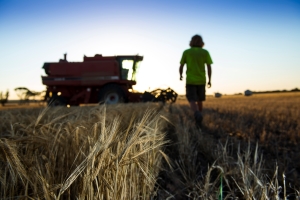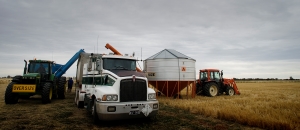Paddock Practices: Managing and retaining staff
Paddock Practices: Managing and retaining staff
Date: 18 Sep 2020

Key points
- Staffing issues are a constraint for many growers, particularly in areas where it is difficult to attract people to live remotely
- Human resources management is an essential component of any business but is often undervalued
- Employers have evolving responsibilities to staff and regulations to follow as a result of COVID-19 control measures
- Planning for labour hire and managing employees fairly and appropriately can set an employer up for success
Attracting and retaining the right staff is an ongoing issue for many grain growers.
Agriculture labour requirements fluctuate throughout the year and often peak at harvest, adding the extra challenge of staffing when grain growers are already under time constraints.
The GRDC Filling the Farm Labour Gap fact sheet recommends employers plan ahead to understand their specific labour needs to source labour resources best suited to their business. This allows time to ensure the correct processes are in place to find the right employee and retain staff either long-term or on a seasonal basis.
The People in Agriculture website, which was developed by key members across the agricultural sector, recommends “creating a better workplace” by looking beyond pay rates. It outlines factors that can help create a positive working environment with a good work-life balance. This includes offering career development options, a safe working environment and reasonable and fair working hours and conditions.
The need to plan is even more critical in 2020 as coronavirus (COVID-19) has changed the way people live, work and travel and the agricultural sector is reporting labour shortages as a result. This is particularly the case when it comes to international travel restrictions limiting the traditional labour source of overseas workers, or backpackers, to take up short-term roles.
Planning labour and recruitment
The need to hire staff is often new territory for many farming operations as the trend to expand has forced staff growth beyond the traditional family-run farm.
The GRDC’s A Guide to Farm Labour publication breaks down workforce planning into six stages (figure 1) and encourages growers to use the same professional approach to hiring employees as used in other areas of the farm business.

Source: A Guide to Farm Labour
These human resourcing processes can be managed in-house, but require time and resources for managing contracts, training, salaries, rosters and recruitment. External agencies can also be hired to manage this part of the business, which can be useful in peak periods and to provide insight from experts when dealing with compliance and legislative requirements.
Growers looking to advertise for roles have a range of traditional options including newspapers. Job advertisements can also be posted via social media. The Australian Government’s Harvest Trail portal provides employers with a portal to reach thousands of people looking for work in the sector.
Induction and employee management
The People in Agriculture website has a range of resources for employers which covers the stages of employing new staff, from payroll and managing staff to employee entitlements and workplace training and development.
The process of interviewing, hiring and inducting a staff member builds a solid foundation of trust and respect between the employer and employee. The GRDC Farm Labour Fact Sheet recommends a labour health check to ensure a smooth process:
- Do you know what your legal obligations are when employing staff?
- Do you know your taxation and superannuation obligations?
- Have you got a compliant, written and signed employment agreement for all staff?
- Do you use a checklist to induct new employees into your farm business?
- Do you know what your workplace health and safety obligations are?
- Is your record keeping up-to-date and accurate?
Australia’s Fair Work Ombudsman provides education, assistance, advice and guidance to employers and provides information on employee pay and leave entitlements. There are also resources to assist with employment contracts and minimum conditions for employees.

COVID-19 considerations
There are specific workplace entitlements and obligations that apply as a result of COVID-19 control measures in Australia. The Fair Work Ombudsman has a specific Coronavirus and Australian workplace laws website to detail workplace entitlements such as quarantine and self-isolation pay and leave options for employees.
The Department of Agriculture, Water and the Environment has a range of services and links to state-specific information relevant to COVID-19 in order to maintain a strong agricultural industry. The department recommends seeking the latest information from state and territory governments as regulations can differ.
In addition to providing the correct leave and entitlements to employees during this time, there are a number of control measures specific to the agricultural industry that employers are required to practice to minimise the spread of COVID-19, even if it disrupts production. These are outlined by Safe Work Australia and include cleaning, the use of masks and physical distancing. These duties come under work health and safety laws and are also important in supporting the health and wellbeing of employees.
Local advice
Western Australian growers and jobseekers can access a WA-specific agricultural jobs directory thanks to WAFarmers via the Grain Farm Jobs in WA website. This resource links to several online job recruitment sources including social media, Gumtree and Rural Enterprises. Growers are also encouraged to seek the latest information on regulations and management from the WAFarmers website and the WA Government.
Free harvest training is being offered at the Muresk Institute as a part of the WA Government’s $25 million skills recovery program. The Broadacre Harvest Operations course will provide students with the skills and knowledge to safely undertake employment for harvest operations in the broadacre sector.
Participants will gain the knowledge to operate a range of machinery used for harvest, including a tractor, header, auger and chaser-bin. This training program will be delivered at Muresk Institute by South Regional TAFE and expressions of interest are also being sought for an Esperance-based course. The course will be provided for free for youth, concession students and displaced workers. For more information email esperance@srtafe.wa.edu.au or call 08 6371 3500.
